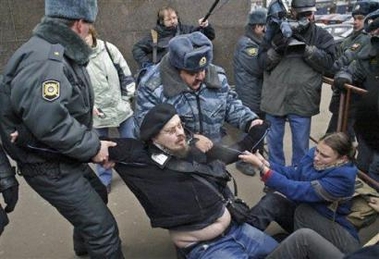|
Russian lawmakers may restrict groups
(AP)
Updated: 2005-11-24 09:18
Russian Lawmakers moved to clamp down on foreign funded groups Wednesday amid
growing Kremlin unease with organizations that promote human rights and
democracy. Critics called it an effort by President Vladimir Putin to broaden
his power.
The proposal to severely restrict foreign-funded nongovernment organizations
gained approval in the Russian parliament's lower house on the first of three
readings.

Russian police work
to detain environmental protesters near to the State Duma, lower
parliament house, in Moscow on Wednesday, Nov. 23, 2005.
[AP] |
The bill requires local branches of foreign NGOs to reregister as Russian
entities subject to stricter financial and legal restrictions. It also further
increases government control of NGOs, allowing official oversight of their
finances and activities.
Foreign-funded groups say the bill, approved by a 370-18 margin, could
effectively terminate their Russian operations if it is eventually enacted.
"The express purpose of this law is to emasculate the NGO community," said
Holly Cartner, regional director of U.S.-based Human Rights Watch.
The group said the bill would "eviscerate" civil society in Russia if passed.
The Kremlin has shown increasing displeasure with nonprofit groups that
criticize the government and advocate democracy. Such groups played significant
roles in the mass demonstrations that brought opposition leaders to power in the
former Soviet republics of Georgia, Ukraine and Kyrgyzstan.
Putin told human rights experts at a Kremlin meeting this summer that Russia
would not allow foreign organizations to finance political activities. In May,
the head of the Federal Security Service, the main successor agency to the KGB,
accused U.S. and other foreign intelligence services of using NGOs to spy on
Russia and foment upheaval in ex-Soviet republics.
Authors of the bill say the measure will make the NGOs' work more
transparent. Critics, however, say it is meant to silence Russia's remaining
voices of opposition.
The bill gives Russian authorities the right to conduct yearly checks at NGO
offices and issue warnings if they are found in violation of regulations
including fire codes, health rules and environmental laws.
A court could close down a nonprofit group if its activity violates the
Russian constitution, or if it is linked to extremist activity or money
laundering.
The new restrictions include a tax on contributions from donors not on a
government list of tax-exempt sponsors and a requirement for founders and
managers to be Russian citizens or permanent residents. For example, the rules
would bar Human Rights Watch's Western leadership from setting its policy and
agenda in Russia, which would likely lead to its closure there, a spokesman
said.
Alexander Cherkasov of the Memorial rights organization — a highly respected
Russian group that receives foreign funding — said the law could lead to the
closure of Western donors' local offices, thus stripping the group of its
funding.
|